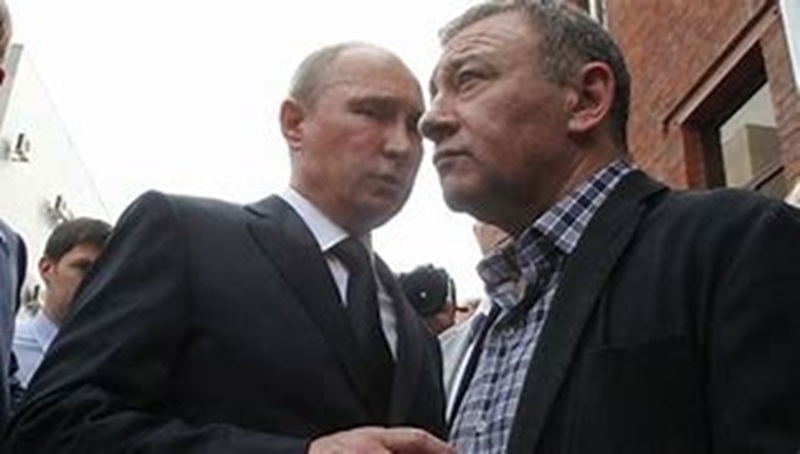New division of property in Moscow
As part of the conversion to a war economy over the past three years, the Russian Attorney General's Office has confiscated 411 large companies from private individuals, with assets exceeding 30 billion dollars. Among the main managers of these operations are the two oligarch brothers closest to President Vladimir Putin, Arkady and Boris Rotenberg.
Moscow (AsiaNews) - Since the beginning of the war in Ukraine, a redefinition of property has been underway in Russia, with a series of nationalisations of companies most sensitive to the war effort and the conversion to a war economy.
Among the main players in these operations, as reported by the Financial Times and others, are the two oligarch brothers closest to President Vladimir Putin, Arkady and Boris Rotenberg, in agreement with the government of Mikhail Mishustin.
In the last three years the Russian Attorney General's Office has confiscated from private individuals 411 large companies, with assets exceeding 2,500 billion roubles, over 30 billion dollars.
Currently, the court is in session for the nationalisation of the only private airport in Moscow, Domodedovo, motivated by the foreign citizenship of the owners, Dmitrij Kamenščik and Valerij Kogan. Furthermore, Putin himself is continually urging the property agency Rosimuščestvo with orders and decrees to transfer to the State the assets of companies that intend to leave Russia because of the war.
Thus the state has taken control of the real estate and assets of Danone, the Baltika brewery (which was owned by the Danish company Carlsberg), the German household goods manufacturer Bosch and the Italian electrical goods company Ariston.
According to the Financial Times, these procedures are essentially motivated by the fact that ‘Putin is not interested in the economy, he is only concerned with war and geopolitics’, entrusting the economic mechanisms to the Rotenberg brothers for these purposes.
They would be the ones to design the whole new concept, with a team of specialists, lawyers and consultants who analyse the data and look for new business to be attributed to the State, through the instruments of the prosecutor's office.
Arkady Rotenberg is known as Putin's childhood friend, and his sparring partner in judo sessions in Leningrad, one of the richest and most influential men in Russia.
According to Forbes estimates, in 2025 Arkady's assets will amount to around 5.5 billion dollars. One of his most grandiose and symbolic projects was the construction of the 19-kilometre bridge over the Gulf of Kerch, connecting the Russian coast to the Crimea after the 2014 annexation, at a cost to the state budget of 3.5 billion dollars.
As Proekt reports, Rotenberg's companies have acquired property in Crimea worth over 4 billion dollars, and his companies are building a new road similar to the Crimean bridge, the railway from Donetsk to Mariupol.
In 2021, Arkady claimed ownership of the lavish presidential palace in Gelendzhik, which was exposed in a famous documentary by Alexei Navalny, absolving his friend Vladimir of all responsibility.
His younger brother Boris is also a billionaire and vice-president of the Russian Judo Federation, as well as being the owner of the Sochi football team.
Both Rotenbergs have been under sanctions from the USA and Canada since 2014, to which were added those declared after the invasion of Ukraine in 2022, together with many other Russian oligarchs accused of supporting the war.
In early April this year, during negotiations between Putin and Trump, the sanctions were surprisingly lifted on Boris's wife, Karina Rotenberg, who is believed to own half of her husband's properties in the West.
As Kirill Gorlov, a lawyer for Transparency International–Russia, explains, there is no single pattern for nationalisation procedures, but there are several approaches that ‘resort to questioning the sales to private individuals in the 1990s, going back as far as Soviet times’.
Alternatively, the new rules for accusing owners of ‘extremism’ are applied, which allows for the automatic transfer of assets to the State, also using forms of ‘temporary administration’ and then resolving everything with government decrees, transferring the ‘compromised’ companies to others considered ‘loyal to the State’, such as those of the Rotenberg brothers.
One of the most frequently used is Roskhim, a chemical company owned by the brothers, which has already snapped up at least three large companies in the sector by easily winning the auction for their destination.
At the same time, the prospects of a peace agreement have stimulated new conditions and mechanisms for the return of foreign companies to Russia, an issue yet to be established due to the resistance of the institutions, but with the vast consensus of the population.
This operation will have to be accompanied by the unfreezing of the assets of Russian individuals and companies that have been frozen abroad since 2022, an issue that the president of the Bank of Russia, Elvira Nabiullina, is also working on, to settle the accounts in the new ‘war and peace’ economic vision of Putin's Russia.
26/05/2018 13:27
12/02/2016 15:14
08/08/2023







.png)










